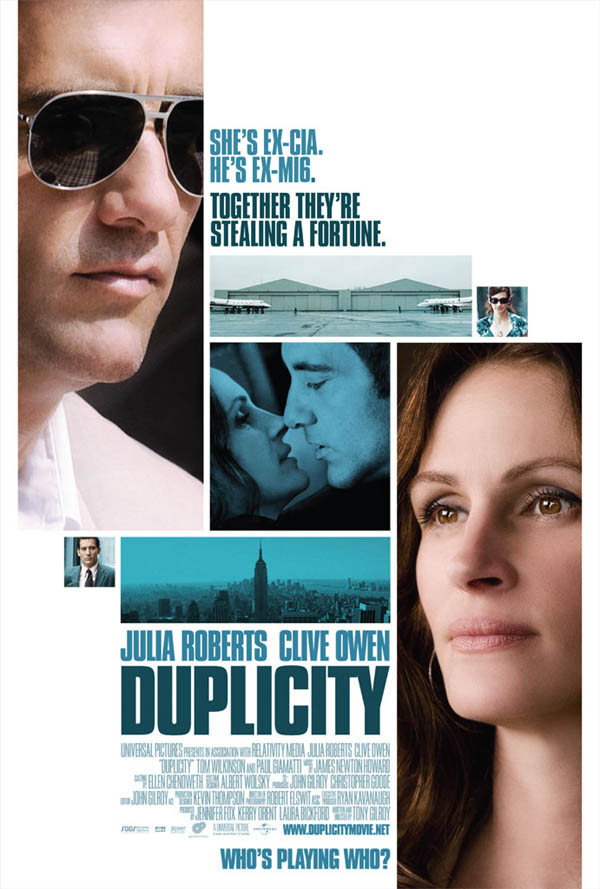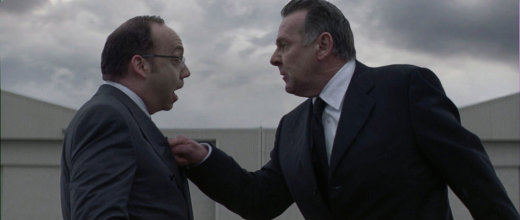

Director: Tony Gilroy, 2009.
After his debut film, Michael Clayton, Gilroy comes back with a stronger, smarter, brighter movie. Both deal with multinational conglomerates, but Duplicity has more pizazz. Perhaps it's the star power of Julia Roberts, or the chemistry between Roberts and Clive Owen. It helps that the screenplay is tight and engaging. Gilroy wrote it himself. And he has written some dandies, including the fabulous Bourne movie trilogy.
Owen plays Ray Koval, an MI6 spy while Roberts is Claire Stanwick, a CIA operative. They meet at a cocktail party in the middle east. His attraction to her leads to the bedroom, naturally. Like James Bond, he gets the best looking babe. But he gets more than he bargained for -- a mickey finn. He gets the long sleep, she gets his secret documents.
Jump ahead several years and neither are working for governments any longer. Now they are corporate spies. That pays much better than the bureaucrats, though the thrills may be somewhat diminished. When they meet, their past catches up with them. Their mutual distaste mirrors that of the two corporate CEOs pitted against one another.
 Indeed, the opening scene sets the tone well. Sitting on the tarmac of a small airport are two company jets, from two rival pharmaceutical companies, facing each other. When Richard Garsik (Paul Giamatti, Sideways) sees his arch-nemesis Howard Tully (Tom Wilkinson, Michael Clayton), something snaps. They get into a yelling, shoving, and wrestling match. There is no love lost between these two.
Indeed, the opening scene sets the tone well. Sitting on the tarmac of a small airport are two company jets, from two rival pharmaceutical companies, facing each other. When Richard Garsik (Paul Giamatti, Sideways) sees his arch-nemesis Howard Tully (Tom Wilkinson, Michael Clayton), something snaps. They get into a yelling, shoving, and wrestling match. There is no love lost between these two.Both are struggling to find the next big drug. Their need for success is matched only by their need for control. Like the drugs they manufacture, success is their drug of choice. And to achieve this, control is their means.
How do we approach success in our lives, especially our professional careers? Is it a goal that must be attained at any cost, as it is here? If so, the truth will shatter your illusion. It is not a worthy goal. Success, like the drugs themselves, gives a short-lasting hit. After the glow of the achievements dims, we are left with a rusty trophy and a higher goal for our next fix. Such a drug will cost us too much; it will cost us our families, perhaps even our souls.
 True success is measured in healthy balance of work and play; it is measured in healthy relationships, with family and friends, even coworkers. True success is measured in pleasing God (1 Thess. 2:4), obeying him and glorifying him (1 Cor. 10:31). These will bring lasting rewards, crowns that will not fade with time but will endure throughout eternity (1 Pet. 5:4).
True success is measured in healthy balance of work and play; it is measured in healthy relationships, with family and friends, even coworkers. True success is measured in pleasing God (1 Thess. 2:4), obeying him and glorifying him (1 Cor. 10:31). These will bring lasting rewards, crowns that will not fade with time but will endure throughout eternity (1 Pet. 5:4).If control is the means for Tully's success, the means for our spiritual success is service. As we serve those around us, we build them up and our relationships grow stronger. We serve God, and in serving him we minister to others. More than service, love is central. When we love God and then our neighbor (Lk. 10:27), we are pouring ourself into an enduring endeavour. Success will surely follow.
Gilroy slyly brings us new information on the love-hate relationship between Ray and Claire. Employing a clever multi-screen view to segue between the past and present, he shows us there is more to this than we first saw. And as the movie progresses, it becomes clear that they have to trust each other and their team to make their spying and stealing work. But even as this emerges, it seems that the different players are playing each other, so that it is unclear who is on whose side. A scam is happening, but what scam?
 This brings us to trust and love. Trust is in short supply here. Can spies really trust? Who do they trust? Certainly, Ray and Claire must trust each other if there is true love between them. But is there this love? For us, if we love someone we need to trust enough to let them see who we really are. We keep our true self hidden most of the time in pursuit of success, but the woman we sleep with needs to know her husband. Ray puts his finger on this when he says to Claire, "I look at you, and I think, 'That woman . . . that woman knows who I am and loves me anyway.' " What is necessary in a human love relationship is infinitely more relevant with God.
This brings us to trust and love. Trust is in short supply here. Can spies really trust? Who do they trust? Certainly, Ray and Claire must trust each other if there is true love between them. But is there this love? For us, if we love someone we need to trust enough to let them see who we really are. We keep our true self hidden most of the time in pursuit of success, but the woman we sleep with needs to know her husband. Ray puts his finger on this when he says to Claire, "I look at you, and I think, 'That woman . . . that woman knows who I am and loves me anyway.' " What is necessary in a human love relationship is infinitely more relevant with God.Jesus is the only person who completely and absolutely knows us, warts and all. And he loves us anyway. It does not matter what you have done, where you have been. He does not hold that against you. He simply loves you and wants you to love him back. He stands at the door waiting for you to open and let him in (Rev. 3:20). No one else offers that kind of unconditonal acceptance and love. After all, isn't that we what we all really want?
Duplicity offers a sharp picture of deceit and double-dealing. It takes us on a merry journey that requires keen observation to follow the trickery and twists. Yet, it lands on the runway of trust and stops at the gate of unconditional love offered by Jesus, who said he was the gate (Jn. 10:7). Will you exit the plane and enter into his love, or will you look for your own form of human success and acceptance like the two CEOs?
Copyright ©2009, Martin Baggs

No comments:
Post a Comment